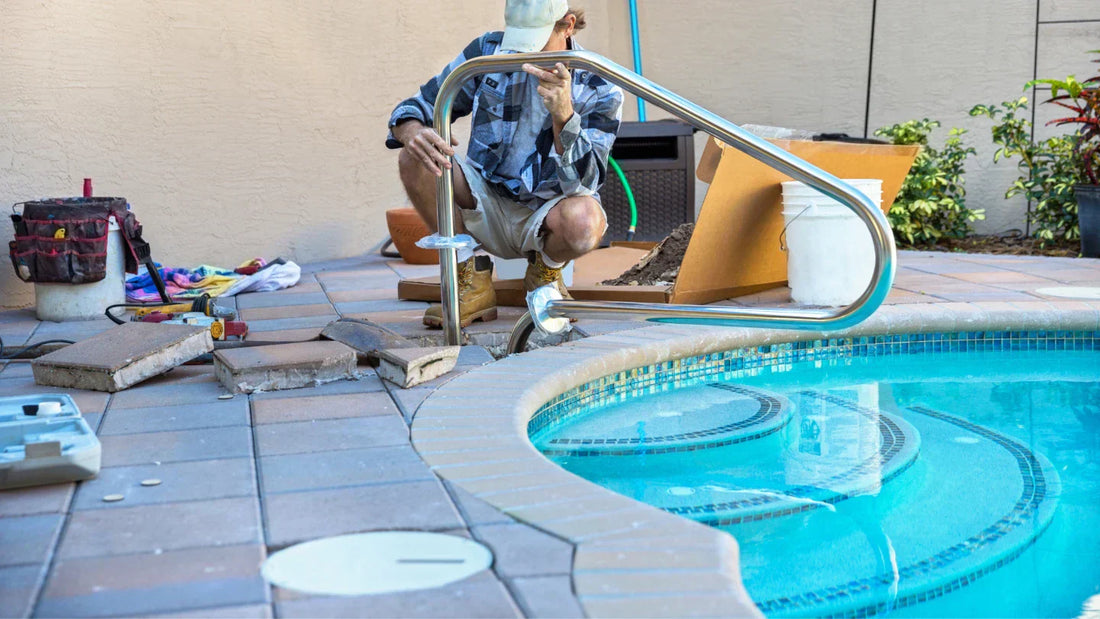This article answers the question "who should install a safety device for a private swimming pool in France?" and is part of a series of articles on safety requirements for swimming pools: Which swimming pools are concerned by the obligation to install a safety device?
The safety of private swimming pools is an absolute priority, especially to protect young children. French legislation imposes strict standards to prevent the risk of drowning. But who is responsible for installing the required safety devices? This article explores the regulations in force in France, the safety standards to be met and the responsibilities of the various parties involved.
Regulations in force in France
Legal requirements for private swimming pools in France
French law no. 2003-9 of 3 January 2003 on swimming pool safety made it compulsory to install safety devices in certain private swimming pools. This law was implemented by decree no. 2003-1389 of 31 December 2003, with the provisions transposed into the French Construction and Housing Code.
Owners of unenclosed private swimming pools where the pool is partially or totally underground must install at least one of the following four standardised safety devices:
- Protection barrier
- Pool alarm
- Safety cover
- Pool shelter
For each of these devices, there is a corresponding standard issued by the "Afnor" French agency that specifies the associated requirements. A device that does not comply with the corresponding standard is considered to be non-compliant, as it does not provide sufficient protection for the pool (note: special case to be considered for devices installed before 7 June 2004).
French law does not impose any particular qualifications on the installer of the device, as the obligation to comply applies to the device installed and not simply to the equipment itself. Once the device has been installed, a technical note must be provided, summarising: the characteristics, operating and maintenance conditions of the safety device; information on the risks of drowning; the general preventive measures to be taken and the recommendations relating to the use of the safety device.
Types of pools affected by the regulations
In France, the obligation to install an approved safety device applies to private pools that are not enclosed, for individual (family) or collective use, whether new or existing, and where the pool is partially or totally underground.
Enclosed, above-ground, inflatable or demountable pools are not covered by this obligation. However, it is still strongly recommended that they be fitted with appropriate protection to limit the risk of drowning. Find out more in our dedicated article: How to secure an above-ground pool?
Safety standards to be met in France
Compliance rules
"Afnor" French agency has defined standards to ensure that swimming pool safety devices comply with the law:
- Barriers: NF P90-306
- Alarms: NF P90-307-1
- Safety covers: NF P90-308
- Pool shelters: NF P90-309
These standards define the technical characteristics and performance requirements to guarantee the effectiveness of the devices.
Proper installation of the safety device is an integral part of compliance. You can have the device installed by the vendor or installer of your choice, or you can install it yourself:
- If you have it installed by a professional: a technical note must be supplied to you on completion of the installation, setting out the characteristics and conditions of operation and maintenance of the device, as well as the general preventive measures to be taken to avoid drowning
- If you install the device yourself: the device manufacturer must provide you with a technical note containing the same information as if the installation were carried out by a professional
Exception: devices installed before 7 June 2004 are presumed to meet the safety obligation if the pool owner is in possession of a document certifying compliance (cf. article D134-54 of the French Construction and Housing Code). This document may be supplied by a manufacturer, seller or installer of safety devices; a qualified technical inspector; or even directly by the owner, under his or her own responsibility, accompanied by the relevant technical evidence.
Consequences of failure to comply
Failure to comply with the regulations exposes the owner to a fine of up to €45,000. In the event of an accident, the owner may also be held criminally liable, incurring an even higher fine and a prison sentence.
Only the owner is liable; the installer (if different) is not.
More information in our article: What are the penalties if I don't install a safety system for my pool?
Responsibilities of the various parties involved
Role of swimming pool owners
By French law, pool owners are solely responsible for ensuring the safety of their pools. They must:
- Choose and install or have made installed a safety device that complies with standards
- Ensure that the system is working properly and is regularly maintained
- Provide a certificate of compliance if the property is sold
Involvement of pool industry professionals
Pool industry professionals (builders, installers) have a role to play in providing advice and support. They must:
- Inform owners of their legal obligations and available safety devices
- Install devices in compliance with standards and good practice
- Provide a technical note detailing the characteristics, operation and maintenance of the device installed
Diagnosticians' contribution
Although there is no legal requirement for existing swimming pools to be diagnosed, a diagnostician can be called in to check that the safety devices are compliant. In the event of a sale, the seller must provide a certificate of compliance, which can be drawn up by a diagnostician.
To sum up: in France, the pool safety device can be installed by you or the installer of your choice (e.g. the vendor or manufacturer). However, you must ensure that the installation complies with the relevant standards and that a technical note or certificate of compliance is available in the event of an inspection.




